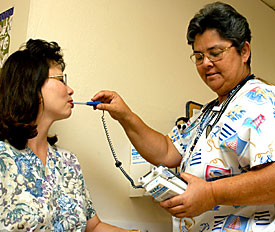 |
|
WILL SEBERGER/Arizona Daily Wildcat
|
Silvia Ann Trejo, right, and Alejandra Olvera, both nurses at Campus Health, demonstrate how to take a patient's temperature. Arizona has a shortage of nurses, but an accelerated degree program at the College of Nursing may soon provide relief.
|
|
By Shelley Shelton
Arizona Daily Wildcat
Wednesday May 14, 2003
New program offers options to students
Forty-eight students, most of them men, are on their way to providing some relief for Southern Arizona's nursing shortage under the UA College of Nursing's new accelerated degree program set to launch next month.
The 14-month Accelerated BSN Partnership Program for College Graduates, a fast-paced curriculum for graduates with college degrees in non-nursing fields, is a collaboration between the College of Nursing, Carondelet Health Network and University Medical Center. The program provides financial support for students earning their bachelor of science in nursing.
Half the students will have their $27,500 tuition entirely covered by Carondelet, and UMC will pay for the rest. Once they have earned their degree, students must work two years for the organization that paid their tuition.
"We had so many applications; it was beyond what I ever dreamt for that program," said Vickie Radoye, assistant dean for student affairs in nursing instruction. "On such short notice, it's been very exciting."
The partnership program was announced in December and the deadline to apply for this year's program was at the end of January.
The selected students range in age from their 20s to 50s, with the majority having some type of science background, Radoye said. To gain admission, students must have completed all prerequisites to the nursing major.
"This new program is truly a win-win-win situation in which all the collaborators, and the Southern Arizona community, will benefit," Marjorie Isenberg, dean of the College of Nursing, said when the plan was announced.
"The health care partners are addressing workforce shortages by investing in their employees of the future; the College of Nursing will have the necessary resources to expand its capacity to educate excellent nurses for our state," she said. "And the students will have the opportunity to prepare, tuition-free, for their careers as nurses in a fast-track BSN program designed specifically for college graduates."
Nationally, the nursing shortage is estimated at 126,000 in hospitals alone and is expected to reach 800,000 by 2020, according to the Bureau of Labor Statistics.
Arizona is projected to have a shortage of more than 8,000 nurses by 2005, meaning one in five nursing positions will go unfilled, according to the Arizona Hospital and Healthcare Association. By 2010, the shortage is expected to rise to more than 10,000.
"Arizona's shortage of nursing professionals is inhibiting hospitals' capacity to care for ill and injured people in our fast-growing state," said John Rivers, president and CEO of AzHHA, a statewide advocacy group of more than 100 health and health-related organizations.
The new UA nursing program is part of a larger national trend, Isenberg said.
"Hospitals are playing a larger role to help expand nursing programs," she said. "The innovative degree program offers the most expedient way to begin a career in the nursing profession."
This semester, 66 students are graduating from the UA nursing college. Although the majority of graduates are traditional students, three are graduating with PhDs and 16 with master's degrees.
Radoye expects next year's accelerated group to be even more diverse than the students starting in June, since the applicants for next year will have had more time to meet their prerequisites.

